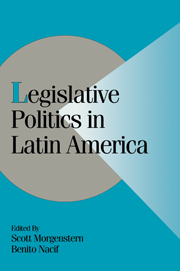Book contents
- Frontmatter
- Contents
- Tables and Figures
- Contributors
- Preface and Acknowledgments
- Party Names and Other Acronyms and Abbreviations
- 1 TOWARDS A MODEL OF LATIN AMERICAN LEGISLATURES
- Part I Executive–Legislative Relations
- Part II Political Parties and Legislative Structure
- Part III Legislatures and the Policy Process
- 10 FISCAL POLICY MAKING IN THE ARGENTINE LEGISLATURE
- 11 PROGRESSIVE AMBITION, FEDERALISM, AND PORK-BARRELING IN BRAZIL
- 12 APPOINTMENT, REELECTION, AND AUTONOMY IN THE SENATE OF CHILE
- 13 THE LEGAL AND PARTISAN FRAMEWORK OF THE LEGISLATIVE DELEGATION OF THE BUDGET IN MEXICO
- Part IV Conclusions
- References
- Author Index
- General Index
11 - PROGRESSIVE AMBITION, FEDERALISM, AND PORK-BARRELING IN BRAZIL
Published online by Cambridge University Press: 14 January 2010
- Frontmatter
- Contents
- Tables and Figures
- Contributors
- Preface and Acknowledgments
- Party Names and Other Acronyms and Abbreviations
- 1 TOWARDS A MODEL OF LATIN AMERICAN LEGISLATURES
- Part I Executive–Legislative Relations
- Part II Political Parties and Legislative Structure
- Part III Legislatures and the Policy Process
- 10 FISCAL POLICY MAKING IN THE ARGENTINE LEGISLATURE
- 11 PROGRESSIVE AMBITION, FEDERALISM, AND PORK-BARRELING IN BRAZIL
- 12 APPOINTMENT, REELECTION, AND AUTONOMY IN THE SENATE OF CHILE
- 13 THE LEGAL AND PARTISAN FRAMEWORK OF THE LEGISLATIVE DELEGATION OF THE BUDGET IN MEXICO
- Part IV Conclusions
- References
- Author Index
- General Index
Summary
This book aims to relate legislators' political ambitions with various aspects of electoral politics and the policy process. In this chapter, I discuss how Brazilian federal deputies' careerist motivations are related to the process of pork-barreling in the yearly budget. In Brazil, the executive branch proposes the budget. Legislators add pork-barrel amendments to this proposal and then pass the budget back to the executive branch. However, the president possesses a line-item veto, so during the budgetary year Brazilian federal deputies spend a significant portion of their time seeking to convince the president to release funds that they want directed to their constituents.
Ames (1995) argued that Brazil's electoral system, which encourages candidates to ignore their parties and campaign on individualistic grounds, encourages all deputies to engage in pork-barreling, and he suggested that deputies devote so much attention to pork-barreling because they want to bolster their chances of winning reelection. However, in other work (Samuels 1998) I questioned whether pork-barreling provides reelectionminded deputies with significant electoral benefits and found no statistical relationship between a deputy's pork-barreling success and his or her subsequent electoral success.
This finding leaves us with a puzzle: If pork-barreling in Brazil provides no clear electoral return, then why do so many deputies devote so much time and energy to it? To reach an answer, we must discuss two distinct notions of political careerism: static ambition and progressive ambition. A deputy who exhibits static ambition seeks to build a career within the legislature. In contrast, a progressively ambitious deputy seeks to leave the Chamber after serving only one or two terms and continue his or her political career at the state and/or municipal level.
- Type
- Chapter
- Information
- Legislative Politics in Latin America , pp. 315 - 340Publisher: Cambridge University PressPrint publication year: 2002
- 16
- Cited by



